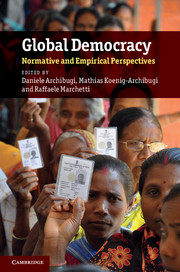Book contents
- Frontmatter
- Contents
- Figures
- Tables
- Notes on contributors
- Acknowledgements
- 1 Introduction
- 2 Models of global democracy
- 3 Citizens or stakeholders?
- 4 Is democratic legitimacy possible for international institutions?
- 5 Cosmopolitan democracy
- 6 Regional versus global democracy
- 7 Towards the metamorphosis of the United Nations
- 8 Flexible government for a globalized world
- 9 Global democracy and domestic analogies
- 10 Global democracy for a partially joined-up world
- 11 Civil society and global democracy
- 12 Global capitalism and global democracy
- 13 From peace between democracies to global democracy
- 14 The promise and perils of global democracy
- Index
- References
9 - Global democracy and domestic analogies
Published online by Cambridge University Press: 05 June 2012
- Frontmatter
- Contents
- Figures
- Tables
- Notes on contributors
- Acknowledgements
- 1 Introduction
- 2 Models of global democracy
- 3 Citizens or stakeholders?
- 4 Is democratic legitimacy possible for international institutions?
- 5 Cosmopolitan democracy
- 6 Regional versus global democracy
- 7 Towards the metamorphosis of the United Nations
- 8 Flexible government for a globalized world
- 9 Global democracy and domestic analogies
- 10 Global democracy for a partially joined-up world
- 11 Civil society and global democracy
- 12 Global capitalism and global democracy
- 13 From peace between democracies to global democracy
- 14 The promise and perils of global democracy
- Index
- References
Summary
Introduction
As shown in the introductory chapter of this volume (Archibugi et al.), for centuries intellectuals from Europe and other parts of the world have devised institutional blueprints aimed at ‘domesticating’ international politics – that is, at imbuing it with the alleged virtues of the domestic politics of well-functioning states, notably strictly controlled use of violence, rule of law and/or democratic methods of conflict resolution. Critiques of such projects have also been heard for centuries. Often the targets of criticism have been not the blueprints themselves but the perceived lack of a realistic explanation of how to get from here to there – that is, the features of possible transition paths towards the more peaceful and just world order envisaged by their authors. For instance, in his commentary on the ‘project for settling an everlasting project in Europe’ presented in 1713 by Charles-Irénée Castel, abbé de Saint-Pierre, Jean-Jacques Rousseau wrote in 1756 that ‘though the scheme in itself was wise enough, the means proposed for its execution betray the simplicity of the author . . . [T]his good man saw clearly enough how things would work, when once set going, but . . . he judged like a child of the means for setting them in motion’ (Rousseau 1756/2008, 126). Almost two and a half centuries later, Philippe Schmitter (1999) berated proponents of cosmopolitan democracy such as Daniele Archibugi and David Held in similar terms: ‘What is even more discouraging than a credible idea of the end-product is the almost complete absence of any idea of the process whereby the world might get there’ (940).
Militant cosmopolitan democrats may be tempted to respond in the spirit of Winston Churchill, who declared in 1946: ‘We must build a kind of United States of Europe . . . The process is simple. All that is needed is the resolve of hundreds of millions of men and women to do right instead of wrong and to gain as their reward blessing instead of cursing’ (Churchill 1946/1988, 664). Of course, such an answer would be unlikely to satisfy most political scientists, whose job often consists in accounting for outcomes that do not seem to be really wanted by anyone and that are variously explained with reference to structural constraints, collective action dilemmas, psychological biases and a range of other devices drawn from the analytical toolbox of the social sciences. If the case for global democratic blueprints such as those presented by Marchetti and Murithi (both this volume) is to be intellectually compelling, discussions about their feasibility should be firmly based on the knowledge of constraints on political choice that has been accumulated since Niccolò Machiavelli affirmed the importance of studying politics as it is and not just how we would like it to be.
- Type
- Chapter
- Information
- Global DemocracyNormative and Empirical Perspectives, pp. 160 - 182Publisher: Cambridge University PressPrint publication year: 2011
References
- 2
- Cited by

